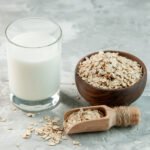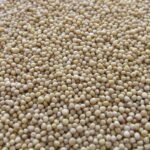Every baking enthusiast knows the feeling – that moment of pure joy when a recipe comes together perfectly. And oftentimes, there’s a little white hero at the heart of it all: baking soda. This everyday household item is a true jack-of-all-trades. It helps your cookies spread, your cakes rise, and your bread brown. But where does this magical substance come from? How can you use it, and what are its nutritional values? Well, we’ve got the scoop for you. So sit tight, and let’s get to the nitty-gritty of baking soda.
From the Ground Up: The Origin of Baking Soda
Did you know that your trusty baking soda started its journey hundreds of years ago, deep within the earth? Yep, you heard right. Baking soda, or sodium bicarbonate as officially known, comes from an ore called trona. The largest deposit of trona on earth can be found in good ol’ Green River, Wyoming, where it’s mined and processed into the baking soda we know and love today.
As a side note, baking soda has been used by humans for thousands of years, albeit not always in the form we’re familiar with today. Its precursor, a substance called natron, used by the ancient Egyptians for everything from making bread to mummification. Talk about versatile!
It’s Not Just for Baking: Uses of Baking Soda
Here’s where things get interesting. Despite its name, baking soda is not just for baking. It has a slew of uses, both in and out of the kitchen:
- Cooking: Besides baking, it can be used to tenderize meat, make a crispy coating for fried foods, and even give a golden brown color to baked goods.
- Cleaning: Thanks to its abrasive properties and ability to neutralize odors, it’s a great natural cleaning agent.
- Health and Beauty: From soothing heartburn to being a key ingredient in DIY face masks, baking soda’s uses know no bounds.

It’s clear as day that baking soda is a household must-have!
Counting the Calories: Nutritional Aspects of Baking Soda
When it comes to nutrition, baking soda is quite a mystery. It’s not consumed in large enough quantities to provide any real nutritional benefits. However, it’s useful to note that it does contain sodium, a necessary nutrient for maintaining normal fluid balance, nerve function, and muscle contractions in the body.
Let’s take a peek at a table showcasing baking soda’s nutritional values:
| Nutrient | Amount per 100g |
|---|---|
| Energy | 0 kcal |
| Carbohydrates | 0 g |
| Protein | 0 g |
| Fat | 0 g |
| Sodium | 27.37 g |
FAQs About Baking Soda
Can I substitute baking powder for baking soda?
Well, it’s a bit tricky! Baking powder and baking soda aren’t interchangeable. Baking soda is about three times stronger than baking powder and requires an acid (like vinegar or lemon juice) to react with. So, if a recipe calls for baking soda and you use baking powder instead, you’ll need about three times as much, and it still might not turn out the same.
Can I use baking soda for cleaning?
Absolutely! Baking soda is a natural abrasive and excellent for scrubbing away dirt and grime. Plus, it’s a fantastic deodorizer. Try it next time you’re tackling a tough cleaning job!
Is baking soda good for my health?
Yes and no. While it can provide temporary relief from heartburn or indigestion, it’s high in sodium, which can lead to high blood pressure if consumed too often. So, it’s best to use it sparingly.
The Bottom Line: The Might of Baking Soda
As we tie up the loose ends, it’s plain to see that baking soda is an unsung hero in our homes. Its versatility and effectiveness are unmatched. Whether it’s making your baked goods light and fluffy, scrubbing your kitchen spotless, or soothing an upset stomach, baking soda has got you covered. Remember, it’s not the size of the dog in the fight, it’s the size of the fight in the dog – and baking soda sure packs a punch!
Fun Facts About Baking Soda
- Baking soda’s chemical formula, NaHCO3, stands for sodium, hydrogen, carbon, and oxygen.
- The use of baking soda as a leavening agent popularized in the 18th century, but its healing properties have been recognized since ancient times.
- There is a National Bicarbonate of Soda Day, celebrated every December 30th in the United States.
Source: USDA National Nutrient Database




